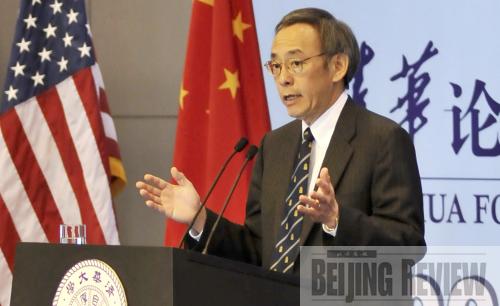|
 |
|
MORE TO BE DONE: U.S. Energy Secretary Steven Chu gives a speech on clean energy and climate change at Tsinghua University in Beijing on July 15 (CFP) |
Clean energy has become a promising area for China-U.S. partnership that will contribute to the long-term stability and growth of the two countries' relations, said Chinese and American international studies experts. The recent visit of two U.S. cabinet secretaries to China is expected to further energize cooperation in this area.
U.S. Secretary of Commerce Gary Locke and Energy Secretary Steven Chu visited China on July 14-17, a visit that highlighted the huge potential for developing mutually beneficial relations in the clean energy sector.
At a meeting with Chinese Commerce Minister Chen Deming on July 15, Locke said he hopes the United States and China will actively work together to develop clean energy and cope with climate change, thus creating more opportunities for cooperation, according to a news release from China's Ministry of Commerce.
The Chinese Government attaches great importance to climate change, energy conservation and emissions reduction and has set clear goals for emissions reduction. Given the tremendous potential for cooperation in these fields, China is willing to work closely with the United States on technological development, investment and trade, such as jointly pursuing energy saving and environmental protection demonstration projects, Chen said.
Long-term benefits
The visit of Locke and Chu was aimed at making preparations for the first China-U.S. Strategic and Economic Dialogue at the end of this month and strengthening cooperation with China in the energy sector to advance the Obama administration's "green diplomacy," said Yuan Peng, Director of the Institute of American Studies at the China Institutes of Contemporary International Relations.
The China-U.S. Strategic and Economic Dialogue is a regular high-level dialogue between the two countries created by Chinese President Hu Jintao and U.S. President Barack Obama at their first meeting in London in April. Replacing two separate dialogues under the George W. Bush administration, it is designed to address a wide range of bilateral, regional and global security and economic issues. The first dialogue is scheduled to be held in Washington, D.C. on July 27-28.
China and the United States share common understanding on climate change and new energy and are willing to work together in these fields, Yuan said. Despite the positive factors, disagreements remain, he said. "While China stands for 'common but differentiated responsibilities,' the United States calls on China to undertake responsibilities beyond its national power and stage of development," he said. "Moreover, the United States is reluctant to sell or transfer its sophisticated technology to China."
"Carbon tariffs" pose another major barrier, Yuan added. The U.S. House of Representatives passed the American Clean Energy and Security Act in June, allowing the government to establish tariffs against trade partners that fail to meet U.S. greenhouse gas emission standards.
China is opposed to carbon tariff policies in international trade, Chen said at his meeting with Locke. He pointed out that carbon tariffs run counter to the principle of "common but differentiated responsibilities" defined in the UN Framework Convention on Climate Change and its Kyoto Protocol, and are actually becoming a new excuse for trade protectionism.
| 